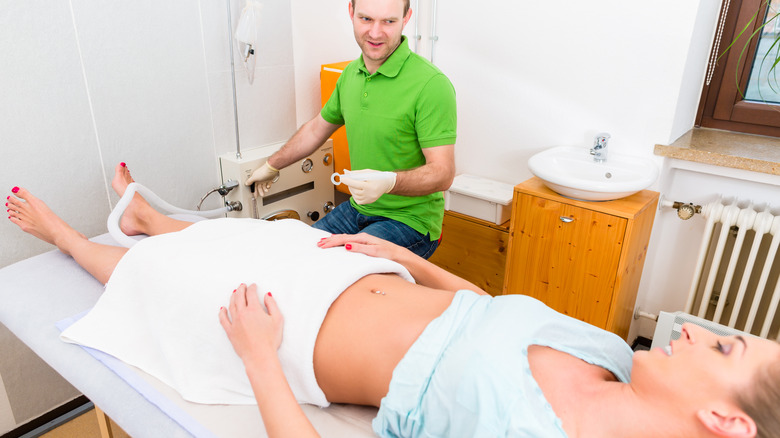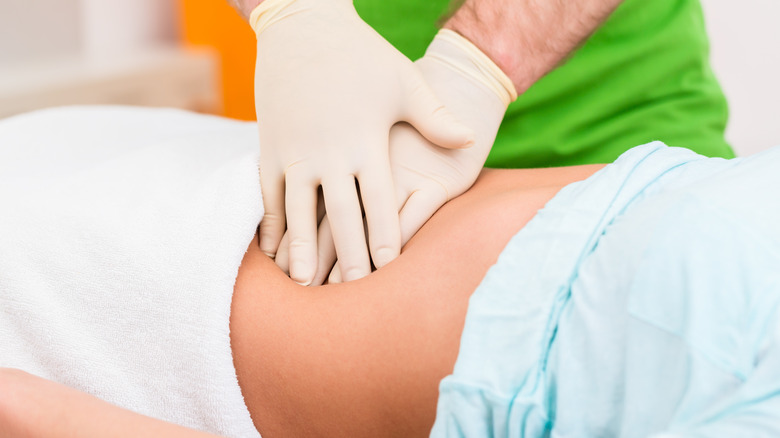What To Expect If You Get A Colonic
Colon cleansing has been a popular alternative health practice for many years, with some believing it can provide various health benefits. Also known as colon hydrotherapy or colonic irrigation, this procedure involves flushing out the colon using water, typically administered through a tube inserted into the rectum, says Healthline. The goal of the procedure is to remove fecal matter and other waste products from the colon to promote better overall health and digestive function.
For many, undergoing a colonic can be intimidating. However, with proper preparation and a clear understanding of what to expect during the procedure, most people find it a relatively painless experience. It's important to consult with a healthcare provider before undergoing colon cleansing, especially if you have a history of digestive issues, electrolyte imbalances, or other medical conditions. Choosing a reputable practitioner who follows proper hygiene and safety protocols during the procedure is also important.
Before the procedure
Before undergoing a colonic, it is important to prepare your body by following the guidelines provided by your clinic to ensure a successful procedure. A few days prior to your appointment, you should avoid dairy and foods high in carbs or sugars. Rather, eat plenty of vegetables to encourage bowel movement, according to Colonics Detox. It would be best if you also avoided caffeine, alcohol, carbonated drinks, and heavy meals, since they act as diuretics.
Drinking plenty of water and staying hydrated in the days leading up to the procedure is essential, per the Complete Health Clinic. The clinic also advises hydrating adequately with raw veggie juice, which may help soften the stool and make it easier to eliminate waste during the procedure. On the day of your appointment, wearing loose, comfortable clothing that is easy to remove is recommended by the European Rejuvenation Center. You may also want to bring a change of clothes and any personal hygiene products you may need after the procedure.
What happens during and after the procedure?
When you arrive for your colonic, your practitioner may offer more detailed instructions about the process and make you comfortable. You may have to lie down on a table or bed, and the practitioner will insert a tube into your rectum, explains Healthline. The tube pumps 60 liters of water into your colon, which flushes out the waste matter that is then carried out of the body through a different tube. The entire procedure normally takes 45 minutes, says Medical News Today.
It's important to follow your clinic's aftercare instructions to ensure successful treatment. If you are unsure about anything, such as which foods to eat after the procedure, be sure to speak with your practitioner or a nutritionist who can answer any questions or concerns you may have. The Colon Clinic advises to abstain from alcohol and spicy foods for at least 24 hours after treatment.
How effective is colon cleansing?
Proponents of colon cleansing believe that the modern diet, which is often high in processed foods and low in fiber, can lead to a buildup of toxins and waste in the colon. The theory behind colon cleansing is that accumulated waste and toxins can lead to various health problems and that flushing out the colon can revitalize the immune system, promote weight loss, and improve overall health and well-being.
However, there is little scientific evidence to support many of the claims made by proponents of colon cleansing. As the Cleveland Clinic notes, the body has effective waste-removal mechanisms. The lungs, liver, and kidneys filter out toxins and waste products, per AcuMedic, and these are then ushered out of the body via natural processes (i.e. urination, defecation, exhalation). Interfering with the usual digestive process can actually cause problems. Indeed, as the Cleveland Clinic points out, colon cleanses are associated with a number of potential risks, and doing one may make existing conditions worse rather than better.
Risks associated with colon cleansing
While colon cleansing through procedures like colonic irrigation is generally considered safe when performed by a trained practitioner, there are some risks associated with this practice, which you should be aware of before deciding to undergo a colon cleanse.
The most common risk associated with colon cleansing is dehydration. The flushing of water through the colon can cause a significant loss of fluids, which can lead to dehydration if not properly replenished, explains Healthline. Colon cleansing and dehydration can also cause an electrolyte imbalance, which can be dangerous if left untreated. Electrolytes are essential minerals like potassium and sodium that regulate many bodily functions, including muscle function, per Cedars Sinai. If electrolytes become imbalanced, it can lead to kidney damage. In rare cases, colon cleansing can cause a tear or perforation in the colon and can also increase the risk of infection if proper hygiene and safety measures are not followed.
People with certain conditions such as heart disease, kidney disease, or gastrointestinal conditions such as diverticulitis or Crohn's disease should avoid colon cleanses, as the procedure might worsen their symptoms and cause other serious health issues (per Cleveland Clinic).
Alternative methods to cleanse the colon
Before engaging in any colon-cleansing methods, it is best to speak to your doctor. They will be able to help you determine if a colon cleanse is the right way to address your particular health concerns, advise if it's safe for you to undergo one, and possibly recommend other strategies first.
One of the most effective ways to detox your colon is to increase your fiber intake. Fiber is essential for maintaining healthy bowel movements and keeping waste products moving through your digestive system, per Medical News Today. You can get fiber from various sources, including fruits, vegetables, whole grains, and legumes. Aim for at least 25-30 grams of fiber daily to keep your colon healthy.
Drinking plenty of water is also crucial for colon health. Water helps flush out toxins from your body and keeps your bowel movements regular, says WebMD. Aim for about 8 cups of water daily, or more if you are physically active or live in a hot climate. In addition to increasing your fiber and water intake, you can make other lifestyle changes to ease constipation and support colon health. For instance, regular exercise can help stimulate bowel movements and reduce the time waste products stay in your colon.






